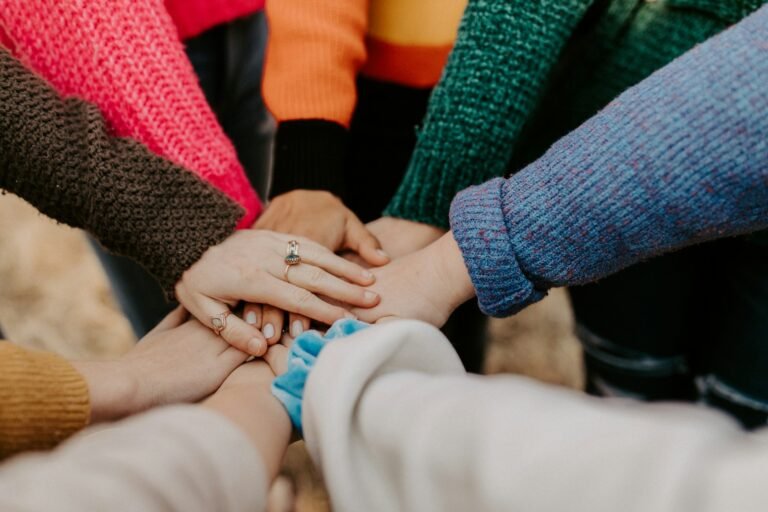How to Build Strong Friendships That Last
You might be wondering how to cultivate friendships that stand the test of time. In my experience, building lasting connections requires effort, understanding, and a sprinkle of fun. In this blog post, I’ll share tips and insights that have worked well for me, helping you navigate the beautiful journey of friendship. Let’s examine creating bonds that not only enrich our lives but also bring joy for years to come!
Key Takeaways:
- Invest time in nurturing relationships through regular communication and shared experiences.
- Practice active listening to foster deeper connections and show genuine interest in each other’s lives.
- Be open and vulnerable; sharing personal stories can strengthen trust and empathy between friends.
- Support each other during challenges and celebrate successes to build resilience and positivity in the friendship.
- Embrace differences and communicate openly about conflicts to enhance understanding and respect.
The Foundations of Lasting Connections
Identifying Core Values and Beliefs
Establishing strong friendships begins with understanding and aligning your core values and beliefs with those of your friends. This alignment creates a solid foundation of mutual respect and understanding. I’ve found that taking the time to discuss what truly matters to each of us—whether it’s kindness, honesty, ambition, or sustainability—can reveal a lot about compatibility. I often share my own values and encourage my friends to do the same, which allows us to connect on a deeper level. If you discover that both of you value loyalty and transparency, it fosters trust that is vital for a lasting friendship.
Engaging in conversations that probe deeper than surface-level topics helps unearth these core values. For instance, I recently had a meaningful chat with a close friend about our perspectives on community involvement and how we can contribute positively to society. This not only strengthened our bond, but it also gave us a shared purpose to support each other’s initiatives, whether it’s volunteering at local charities or advocating for important causes.
Cultivating Shared Interests and Goals
Exploring and cultivating shared interests is an exciting part of building lasting friendships. Activities you both enjoy, such as hiking, reading, or cooking, create numerous opportunities for bonding experiences. I often find that engaging in these shared activities not only fosters fun memories but also allows us to learn from each other and grow. For example, I joined a book club that a friend started, and through discussions about the readings, I’ve discovered new layers to our friendship. These shared experiences create a tapestry of moments that solidify our connection.
Shared goals amplify this dynamic, leading to collaborative experiences that strengthen your bond even further. Whether it’s a fitness goal, a personal project, or a bucket list item, working together makes it more enjoyable and fulfilling. I once teamed up with a friend to run a half-marathon, and the training sessions and motivational talks we had were not only about improving our physical fitness but also about supporting each other in our personal aspirations. Achieving a collective goal, like completing a run or finishing a joint project, positively impacts the friendship, reinforcing the idea that you are both invested in each other’s success.
The Art of Communication
Effective communication is the backbone of any strong friendship. It’s not just about exchanging words, but about connecting with your friend on a deeper level. The nuances of tone, body language, and even the pauses in our conversations play imperative roles. I’ve found that making small adjustments in how I communicate can lead to more meaningful interactions. Sometimes, simply asking open-ended questions can invite your friend to share more, leading to richer discussions and a greater understanding of one another. The better we are at expressing ourselves, the more we encourage our friends to do the same, which ultimately strengthens our bond.
Mastering Active Listening Techniques
Active listening goes beyond just hearing what the other person is saying; it involves engaging with them fully. I often practice techniques such as maintaining eye contact, nodding to show I’m engaged, and summarizing what my friend has said to confirm my understanding. This not only makes them feel heard, but it also helps me process the conversation more effectively. For instance, when a friend is sharing their struggles, I find that reflecting back on their emotions deepens our connection. It’s a powerful way to validate their feelings while also creating a safe space for dialogue.
Crafting Vulnerable and Honest Conversations
Vulnerability can feel daunting, but it’s key to developing authentic friendships. I try to share my thoughts and feelings even when it’s uncomfortable, which encourages my friends to do the same. These honest conversations often lead to breakthroughs in understanding and intimacy. By revealing my fears or joys, I’ve experienced moments where a friend responds similarly, creating an unbreakable bond through shared experiences. One memorable conversation I had involved sharing my anxiety about an upcoming life change, which opened the door for my friend to share their own insecurities. Suddenly, we weren’t just friends; we were confidants, which added a rich layer to our relationship.
This kind of vulnerability creates trust, which is the foundation for lasting friendships. Honesty doesn’t always have to be about deep emotions; sometimes, it’s as simple as sharing what you genuinely think about a movie you both just watched. The more you practice openness, the more natural it becomes to have those deeper discussions that will draw you closer together over time. Think of it as building a bridge—each honest exchange adds another plank, making your bond stronger and more resilient.
Building Trust: The Invisible Glue of Friendship
Demonstrating Reliability and Consistency
Trust is cultivated through our everyday actions, and consistency plays a major role in this. I’ve found that being reliable starts with small commitments. If I say I’ll call a friend on a specific day, I make it a point to follow through. Likewise, if you’re there for your friends during tough times, it becomes a foundation for a stronger bond. Small gestures, like remembering birthdays or showing up when you say you will, gradually build a reputation for reliability. Over time, these little actions accumulate to create an unshakeable sense of trust.
Living your life with integrity strengthens this bond, particularly in challenging moments. I calculate that most friendships go through bumps in the road. But if I consistently show up with honesty and support, it reassures my friends that they can count on me. Regular communication can reinforce this reliability; sending a quick message just to check in shows that you genuinely care, enhancing your overall trustworthiness in their eyes.
Navigating Conflicts with Empathy
Disagreements can arise in any friendship, but how we navigate these conflicts can either strengthen or weaken our bonds. Approaching conflicts with empathy is key. When I face a disagreement with a friend, I try to put myself in their shoes. Understanding their feelings can illuminate perspectives I might have initially overlooked. This doesn’t mean I have to agree on everything, but acknowledging their emotions fosters an environment where we can discuss our differing viewpoints openly.
Consider a situation where a misunderstanding has caused tension. Expressing empathy could be as simple as saying, “I can see why this upset you.” This basic acknowledgment can diffuse anger and set the stage for a constructive dialogue. It’s fascinating how much impact a few kind words can have on steering conversations in a positive direction. The ultimate goal here is not just to resolve the conflict but to emerge from it even more connected, which solidifies trust and deepens the friendship.
Navigating conflicts with empathy often requires active listening and being willing to share your own vulnerabilities as well. By allowing yourself to be open about your feelings while also honoring your friend’s emotions, a deeper connection is formed. This two-way street of understanding can transform conflicts into opportunities for growth, making the friendship much more resilient in the long run. Handling these situations with care gives both parties the chance to heal, learn, and often come out stronger than before.
Nurturing Friendships Through Time and Change
Making Time for Meaningful Experiences
Investing time in each other is a foundational element of any lasting friendship. It’s easy to let life’s distractions steal away moments that could be spent together, but prioritizing these experiences can strengthen the bond between friends. I’ve found that planning regular catch-ups, whether it’s a monthly coffee date or a bi-weekly dinner, creates a rhythm that both of us can count on. These meetings don’t always need to be extravagant; simply sharing a meal or going for a walk can lead to great conversations and experiences that deepen our connection. Plus, committing to these quality moments makes it easier to stay attuned to what’s happening in each other’s lives.
Another way I make time for meaningful experiences is through shared hobbies or new adventures. Whether it’s taking a cooking class together or planning spontaneous weekend trips, these activities invite growth within our friendship. I recall a time when my friend and I signed up for a pottery workshop, each of us stepping outside our comfort zones. The laughter and fun we shared while trying to shape our clay pieces created cherished memories that still make us smile. Consistently creating these opportunities allows the friendship to flourish, even amidst busy schedules.
Embracing Change and Growing Together
Change is inevitable, and embracing it can lead to profound growth for both individuals in a friendship. I’ve experienced how life transitions—be it moving to a new city, starting a family, or adopting a new career—can create distance if not addressed. By acknowledging changes as part of our journey together, you can adapt and evolve your friendship. This takes open communication and a willingness to explore how these life shifts can be integrated into your relationship. For instance, if one friend has a tight schedule due to work, showing understanding and being flexible is important to keep that connection alive.
Navigating these changes often brings unique opportunities for growth. I’ve had moments where my friend and I found ourselves sharing new perspectives as our lives changed, which enriched our conversations and developed our bond further. You’ll discover that being supportive during tough times and celebrating each other’s achievements can transform challenges into stepping stones for your friendship. The ability to grow together not only strengthens the relationship but often leads to a deeper understanding of each other’s values and aspirations.
Being open to change has allowed me to appreciate the different phases of my friendships, understanding that every shift can lead to fresh opportunities for connection. In my experience, it’s refreshing to explore new aspects of a friend’s life, gaining insight into their personal growth while sharing your own. These moments of mutual understanding create a tapestry of shared experiences that serve as a solid foundation for lasting friendships.
Expanding Your Friendship Circle
Exploring New Social Opportunities
Stepping into new social arenas can reignite your social life and provide fresh opportunities for connection. Joining clubs, classes, or community events gives you the chance to meet like-minded individuals who share your interests. For instance, if you’re passionate about photography, enrolling in a local workshop can help you bond with fellow enthusiasts. These environments foster natural interactions, breaking the ice with shared passions, making it easier to forge new relationships. One of the best aspects of trying something new is that the shared experience creates instant common ground.
Additionally, platforms like Meetup or local Facebook groups can introduce you to people who are excited about the same activities, whether it’s hiking, book discussions, or board game nights. If you make it a goal to attend at least one new event each month, you’ll likely find yourself expanding your social sphere in no time, developing friendships that could turn into lifelong bonds. Once you’ve stepped out of your comfort zone, you might be surprised by how many warm and welcoming connections you can cultivate through shared interests.
Building Bridges Between Different Groups
Connecting with various social circles can enrich your friendships and provide diverse perspectives. This is particularly valuable when I notice that my friends have different hobbies, backgrounds, or points of view. Introducing friends from one group to another can not only strengthen existing bonds but also foster new friendships. For example, I might invite my book club friends to join my hiking group for a weekend outing. They might not share the same interests at first, but shared experiences will help them find common ground.
When bringing different groups together, find activities that appeal to both sides and allow everyone to participate. Think of organizing an inclusive potluck where each friend contributes a dish. This not only promotes interaction but also celebrates each person’s culinary background, paving the way for enriching conversations and connections. Watching friendships bloom across groups becomes incredibly rewarding as I see the new dynamics flourish, proving that the more we connect, the more we learn from each other.
Final Words
With these considerations, I believe anyone can cultivate strong friendships that endure the test of time. It’s all about being present, open, and supportive of one another. As you invest in your friendships, you create meaningful bonds that can withstand life’s ups and downs. Pay attention to the little things that matter, like sharing experiences or simply being there when your friends need you. Authenticity and consistent communication will foster trust and love, much like a garden that flourishes with care and attention.
If you’re looking for more tips on fostering these lasting connections, I encourage you to check out Four Ways to Build Lasting Friendships. I hope these insights will help you grow and maintain your friendships, enriching your life in ways that are truly rewarding. After all, strong friendships not only enhance our lives, but they also provide a support system we can lean on through thick and thin.
FAQ
Q: What are the fundamental qualities to look for in a potential friend?
A: When seeking out friendships that are likely to last, consider qualities like reliability, honesty, and empathy. A good friend should be someone who supports you during tough times and celebrates your successes. Shared interests and similar values can also help strengthen the bond between friends, but the most enduring friendships often develop from mutual respect and understanding.
Q: How can I initiate conversations to build deeper connections?
A: Starting conversations can be as simple as asking open-ended questions about interests or experiences. Engaging in active listening is key—make sure to show genuine interest in the other person’s responses. Share your own stories to create a comfortable exchange. Discussing topics such as hobbies, life goals, or personal experiences can foster a deeper connection. This encourages openness and vulnerability, both of which are vital for building lasting friendships.
Q: What role does trust play in maintaining lasting friendships?
A: Trust forms the foundation of any strong friendship. To cultivate trust, it’s important to be consistent and reliable in your actions. This means following through on promises, respecting each other’s boundaries, and being honest. When trust is established, friends can confide in one another and share their thoughts and feelings without fear of judgment. This openness fosters a safe environment where the friendship can thrive over time.
Q: How can I keep the friendship strong over time, even when life gets busy?
A: Maintaining friendships requires effort, especially during busy periods. Regular check-ins via texts, calls, or social media can help keep the connection alive. Scheduling occasional meet-ups or virtual hangouts can also reinforce the bond. It’s important to prioritize quality time together, even if it’s short. Small gestures like sending a thoughtful message or sharing a favorite meme can show that you care, ensuring that the friendship remains vibrant despite life’s demands.
Q: What should I do if conflicts arise in my friendships?
A: Conflicts are a natural part of any relationship. When disagreements occur, it’s important to approach the situation with openness and a willingness to communicate. Discuss the issue calmly and listen to each other’s perspectives. Avoid placing blame, and instead focus on finding common ground or a solution that works for both parties. Apologizing when necessary and being willing to forgive can help mend the relationship and make it even stronger going forward.








